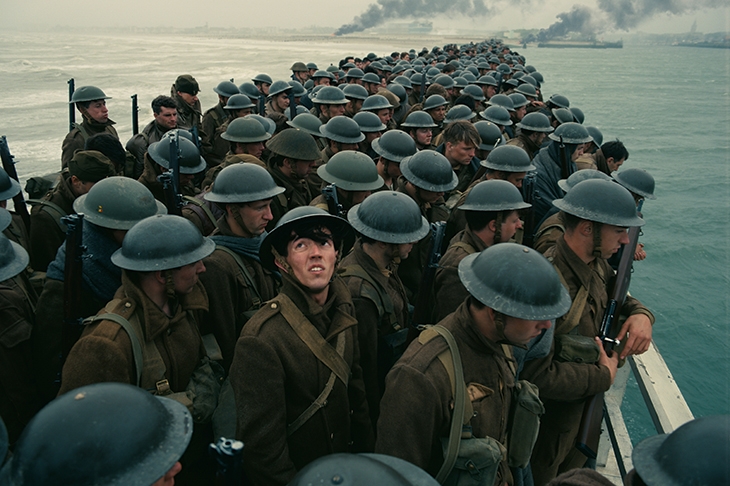Christopher Nolan’s Dunkirk has already been described as ‘a masterpiece’ and ‘a glorious, breathtakingly vivid triumph’, but we need to be cautious. Look at all the fuss about Baby Driver and what an average film that turned out to be. This certainly isn’t your regular war film — no one, for example, says ‘it’s quiet’ and is then told: ‘yes, too damned quiet…’ — but in wanting to deliver a visceral, visual experience, without the hindrance of exposition or back stories, the narrative is often confusing and doesn’t add up to much emotionally. I suppose I should also add that, aside from the odd glimpse of a nurse, there are no roles for women, although, in this instance, I have decided not to call for any kind of boycott. (I must be softening in my old age.)
This account of the Allied evacuation of occupied France in 1940, which still seems entirely miraculous — 338,226 men were rescued — is told from three perspectives: land, air and sea. By land, it is Tommy (Fionn Whitehead), a teenage squaddie who, at the film’s outset, is seen scrambling to the beach through a Dunkirk under heavy fire. He will later encounter another young solider, Alex, as played by One Direction’s Harry Styles, who doesn’t embarrass himself, but as this is a film with sparse dialogue — it’s the visuals that do the heavy lifting — he’s given little to say, which may be a blessing. By air, it’s Tom Hardy and Jack Lowden as the Spitfire pilots seeking to protect those below. (Given their flight helmets, it was often hard to tell which was which; there is a lot of eyebrow acting either way.) Meanwhile, by sea, it’s Mr Dawson (Mark Rylance), a civilian with a little boat who has responded to the call for help and who picks up a shell-shocked officer (Cillian Murphy) on his way. Lastly, one more character: Kenneth Branagh as the highest-ranking naval officer at the scene, and who, in a regular war film, would have been played by Kenneth More. It’s just one of those roles that calls for a Kenneth, you could say.
Filmed in the Imax format — it’s bigger and better, basically; they probably don’t put it like that in Sight & Sound, but it’s the truth — there are some breathtakingly vivid moments: spilt oil setting the sea on fire; soldiers trudging apocalyptically through the sludgy foam at the water’s edge; the swooping view from the Spitfire cockpits, filmed with real cameras in real planes. Nolan (Inception, Interstellar, The Dark Knight Rises) has eschewed CGI, which is welcome, but it tells in some places. Instead of swarms of soldiers populating the beach, it sometimes looks like a couple of post office queues (bit busy, I thought; I’ll come back later), and instead of swarms of civilian boats, it’s Mr Dawson’s, and that’s about it. I would also suggest that, as nothing is explained, and as the ear-shattering orchestration often drowns out what dialogue there is, you may wish to do some research before you go. (Wikipedia is quite good.) In this way, you won’t be tormenting yourself with questions like, ‘What is this “mole” that Kenneth keeps speaking of?’*; and, if the Germans have cornered their enemy, why aren’t they relentlessly bombing the hell out of them?
But mostly you must understand that Nolan wants us to come at events as they happened, which means this isn’t about individual heroism, or any kind of character development. (No one carries a letter from a beloved in their inside pocket, for example.) It is brave, and even admirable, but if you are fond of an emotional core? Then you will sorely feel the lack of it.






Comments